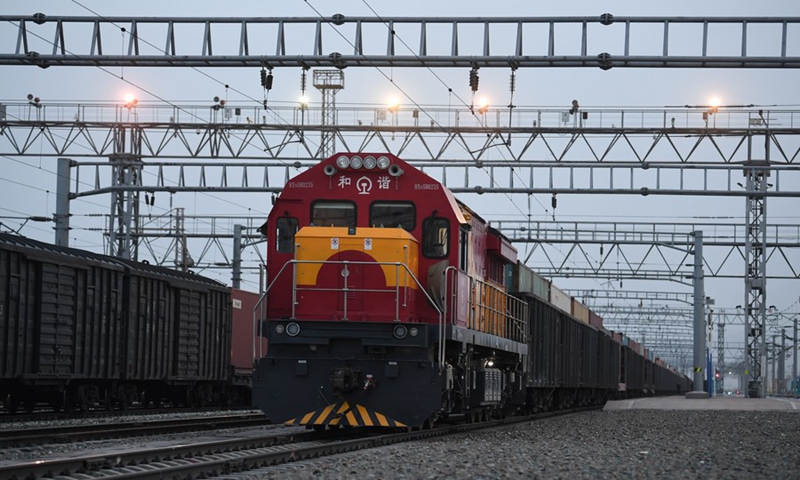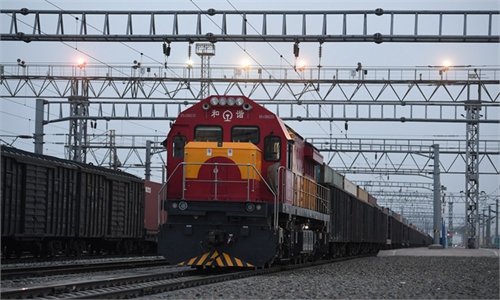Trump’s decoupling with China hurts Europe’s supply line: business chamber
EU Business group should blame Washington: analysts

A China-Europe freight train pulls out of Alataw Pass in northwest China's Xinjiang Uygur Autonomous Region, April 12, 2020. (Xinhua/Sadat)
European companies are increasingly concerned about the impact of US-China economic decoupling - facilitated by the trade and tech war launched by the Trump administration against China - on their supply chains, telecom equipment supplies and market access, some of which could inflict considerable damage on their investments in China in the post-virus era, a business report showed on Thursday.
But the completion of the China-Europe Bilateral Investment Treaty (BIT) negotiations could offer a glimpse of hope to cushion Europe against this negative impact, industry observers said. Rather than taking aim at China, which has always been a firm advocate of globalization, the European business community should blame the US and communicate with the incoming Joe Biden administration about a possible policy reversal, they noted.
About 68 percent of European firms said that supply-chain decoupling will negatively affect their business, according to a report jointly issued by the European Chamber of Commerce in China (EUCCC) and the Germany-based Mercator Institute for China Studies on Thursday.
The report, titled "Decoupling: Severed Ties and Patchwork Globalization," measures the costs of decoupling for businesses operating in China for European firms.
Access to critical inputs is already a pressing concern for European companies operating in China, particularly as they seek to leverage off China's post-COVID growth story, according to the report. Meanwhile, the tit-for-tat tariff war between China and the US has taken a bite out of European companies' business.
The US has imposed restrictions on the sale and export of critical goods to China - including semiconductors, manufacturing equipment and software - as part of its measures to maliciously crack down on China's technology rise, industry observers said.
According to the report, about 27 percent of European companies said their products rely on US-produced semiconductors and software for which there are no alternatives, highlighting how US export restrictions could affect the production of European companies, particularly for the high-technology sector.
Telecoms is another sector that is caught in the crossfire of the trade war between the world's two largest economies. The report noted that the US' anti-China "clean network initiative", which aims to purge Chinese telecommunications and network equipment from the internet, is affecting European companies and their offerings in the US network.
According to the report, some European respondents stressed that their global operations would be "drastically" hit if they were asked to remove all Chinese hardware and software from their telecom networks.
Other concerns include China's accelerating push for technology self-reliance, and its export control law that restricts exports of key domestic technology, which the report said could fuel the ongoing decoupling process.
In response to the report, Gao Feng, spokesperson for China's Ministry of Commerce (MOFCOM), said at a press briefing in Beijing on Thursday that "China has no intention to decouple from the world, and it is also impossible to decouple."
"China's goal of self-developed industries does not contradict global industrial chain cooperation," Gao said, while reiterating China's strong objection to protectionism and unilateralism.
Cui Hongjian, director of the Department of European Studies at the China Institute of International Studies, told the Global Times on Thursday that the chamber's worries about China's technology exports and market access with regard to decoupling are baseless.
"The way that China cooperates with Europe is evolving in a dynamic environment as China's technology sector climbs up the ladder. But unlike Washington, Beijing is not aiming to claim dominance and always promotes technology cooperation," Cui said, urging the European side to abandon its one-sided view and misunderstanding toward China.
Joerg Wuttke, the president of the EUCCC, urged that both Beijing and Washington should make efforts to ensure "the sort of aggression is being dialed down" and leave more space for political communication.
Cui said that the responsibility for the decoupling trend sits with the US side and European business group should not blame China for the collateral damage.
"From a realistic view, the European business community should approach the incoming Biden administration - which values the US' relations with close allies - with their complaints," Cui added.
Wuttke told the Global Times that the decoupling trend won't reverse in the near term, even with the incoming Biden presidency, which is less likely be caustic.
"There is a growing bipartisan consensus in Washington to consider China a strategic competitor… It's like an aircraft, which is very difficult to change course," Wuttke noted.
But analysts expect that the China-Europe BIT, which expands bilateral market access, will mitigate the impact of the Washington-led decoupling on European businesses if the deal is signed and enforced at an early date.
In December, China and Europe completed negotiations for the epic BIT, with both making "high-level and reciprocal" market access commitments, and all the rules are "applied both ways," according to a statement issued by the MOFOCM.


